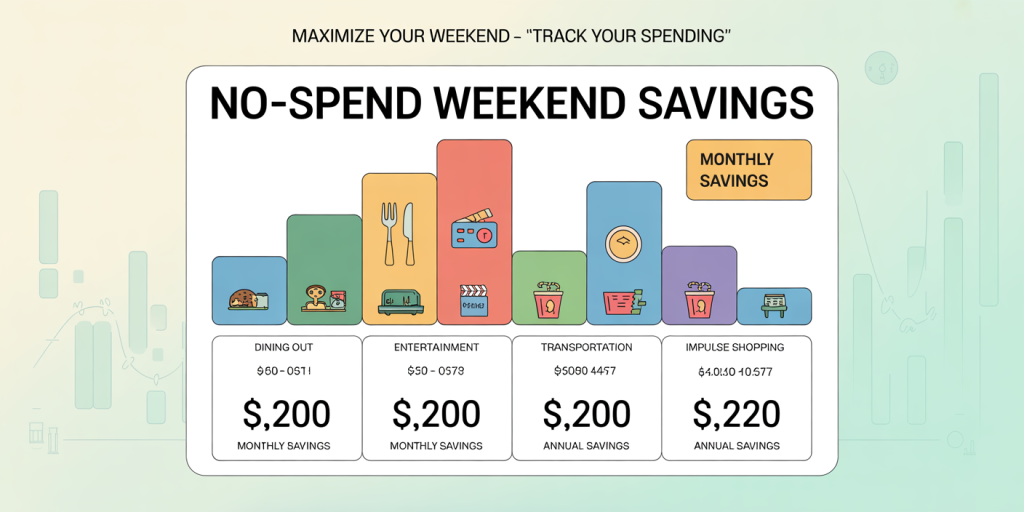In an era where consumerism dominates daily life, the concept of a no-spend weekend is gaining traction as an effective financial strategy. A no-spend weekend involves deliberately avoiding all unnecessary expenditures over a two- or three-day period, typically from Friday evening to Sunday night. This practice encourages mindfulness about spending habits, helps curb impulsive purchases, and provides a reset opportunity to evaluate personal finances.
With statistics showing that Americans spend an average of $111 per day outside of housing costs (source: U.S. Bureau of Labor Statistics), a temporary pause on spending can have significant benefits. Not only does this provide immediate financial relief, but it can also build long-term budgeting habits. For many, no-spend weekends foster creativity in personal activities, shifting focus from consumption to enjoyment of what is already available.
Understanding the Benefits of a No-Spend Weekend
Creating a no-spend weekend offers several tangible benefits for both your financial health and mental well-being. One of the most immediate advantages is cost savings. By consciously avoiding frivolous spending during a weekend, individuals can potentially save hundreds of dollars each month, creating a financial cushion for emergencies or future investments. For example, a family that spends $50 on dining out every Friday and Saturday can save approximately $200 per month through no-spend weekends alone.
Beyond monetary savings, no-spend weekends promote greater awareness of spending triggers and habits. Research shows that impulsive buying accounts for roughly 40% of consumer purchases, often driven by emotional states such as boredom or stress (Journal of Consumer Psychology, 2021). When spending is paused, individuals can identify what drives these purchases, making it easier to adjust behavior over time. Additionally, such weekends encourage reconnecting with hobbies or activities that do not require financial input, which can reduce stress and enhance happiness.
Planning and Preparation for Successful No-Spend Weekends
Successful implementation of a no-spend weekend requires thoughtful planning and preparation. Start by identifying the specific days that suit your lifestyle, typically from Friday evening through Sunday night, to maximize free time without financial commitments. Communicate your intent to family or roommates to gain support and reduce temptation.
Preparation also involves practical steps, such as stocking your pantry with essentials before the weekend begins. For example, preparing homemade meals in advance can eliminate the need to eat out—a common and costly weekend expense. Ensure you have basic transportation needs covered, such as a full tank of gas or a charged transit card, to avoid the impulse to spend on rideshare services. Creating a checklist of activities that are free or low-cost will help maintain engagement during the weekend. Examples include hiking, visiting local parks, reading books, or engaging in home improvement projects.

Strategies to Curb Spending Temptations
Controlling spending temptations is critical during a no-spend weekend. The omnipresence of online shopping and marketing campaigns can quickly derail efforts. One effective strategy is to deactivate shopping apps or unsubscribe from promotional emails before the weekend. Research by Harvard Business Review highlights that reducing exposure to advertising significantly decreases impulsive purchases.
Another practical approach is to employ cash-only spending in emergencies during these weekends, rather than relying on credit or debit cards. This physical limitation enhances mindfulness and often leads to reconsidering purchases. Moreover, substituting social outings that involve spending with free alternatives can maintain social bonds without financial costs. For example, instead of meeting friends at a café, organize a potluck picnic at a local park.
Engaging in mindfulness techniques also aids in resisting urges to spend. A study published in the Journal of Financial Therapy demonstrated that mindfulness-based interventions reduce compulsive buying behaviors by increasing self-awareness and emotional regulation. Activities such as journaling spending urges, deep breathing, or brief meditation sessions can reinforce discipline during the no-spend period.

Tracking Progress and Analyzing Financial Impact
Measuring the effectiveness of no-spend weekends enhances motivation and informs future adjustments. Using budgeting apps such as Mint or YNAB (You Need A Budget) allows detailed monitoring of expenditures and savings. Tracking not only involves quantifying money saved but also documenting behavioral changes and emotional responses.
Below is a comparative table illustrating the potential savings of no-spend weekends against typical weekend spending habits for an average adult:
| Category | Typical Spend (Per Weekend) | No-Spend Weekend Spend | Monthly Savings (4 Weekends) |
|---|---|---|---|
| Dining Out | $40 | $0 | $160 |
| Entertainment | $30 | $0 | $120 |
| Transportation (rideshare/gas) | $20 | $10 (fuel only) | $40 |
| Impulse Shopping | $25 | $0 | $100 |
| Total | $115 | $10 | $420 |
This example suggests that monthly savings of over $400 are feasible with a consistent no-spend weekend approach, an amount equating to over $5,000 annually. For many households, these funds could significantly contribute toward debt repayment, emergency funds, or investments.

Regular reflection on the emotional and psychological effects of no-spend weekends is also valuable. Many participants report reduced anxiety about money and increased satisfaction in finding creative ways to enjoy free time. This feedback loop strengthens adherence to spending discipline beyond just the designated weekends.
Real-Life Examples and Case Studies
Consider Sarah, a 32-year-old marketing professional, who adopted a no-spend weekend routine after realizing her credit card debt was growing due to weekend dining and shopping. Within three months, Sarah cut her discretionary spending by 35%. Instead of eating out, she experimented with cooking new recipes, which she documented on a personal blog, fostering both savings and a new hobby.
In another example, Mark and Lisa, a couple with two children, instituted monthly no-spend weekends to manage family expenses better. They used the time to explore free local activities like community festivals and museum days. By redirecting their focus from spending on entertainment, they managed to save over $5,000 annually, which was invested into their children’s education fund.
These cases underscore the adaptability of no-spend weekends for varying lifestyles and goals, highlighting the universal benefits of intentional spending pauses.
Future Perspectives on No-Spend Weekends and Financial Wellness
The growing emphasis on sustainable living and financial wellness indicates a promising future for no-spend weekends. As consumers become more environment-conscious, no-spend weekends align with reducing consumption and waste, contributing to eco-friendly lifestyles. Additionally, the rise in digital banking tools and personalized financial tracking will facilitate easier implementation and monitoring of no-spend challenges.
On the technological front, financial apps are increasingly incorporating behavioral nudges and community challenges that can support no-spend weekends. These platforms encourage peer support, accountability, and educational resources to sustain long-term budgeting success.
Moreover, employers and wellness programs are beginning to recognize the broader benefits of financial mindfulness on overall well-being. Integrating no-spend weekend challenges into corporate wellness initiatives can promote healthier work-life balance and reduce financial stress among employees.
As personal finance habits evolve, no-spend weekends may transition from niche practices to mainstream financial health strategies. Encouraging households worldwide to engage in regular spending fasts can foster more responsible consumer behavior, reduce debt levels, and promote economic stability on both individual and societal levels.
Adopting no-spend weekends is an accessible and impactful approach to enhancing financial discipline, saving money, and improving quality of life. Through careful planning, strong strategies to resist temptation, and diligent tracking, anyone can successfully create no-spend weekends tailored to their lifestyle. The practice also aligns closely with broader trends emphasizing sustainability and wellness, suggesting that no-spend weekends will become increasingly relevant in the years to come.